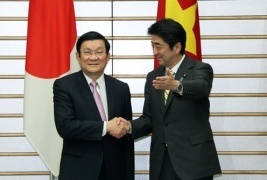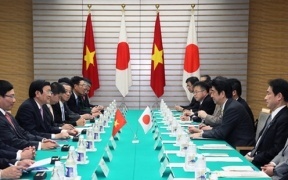Asia
Japan-Viet Nam Summit Meeting
March 18, 2014
 Photo: Cabinet Public Relations Office
Photo: Cabinet Public Relations Office
 Photo: Cabinet Public Relations Office
Photo: Cabinet Public Relations Office
On March 18, commencing at 5:45 p.m. for approximately one hour, Mr. Shinzo Abe, the Prime Minister, held the Japan-Viet Nam Summit Meeting with H.E. Mr. Truong Tan Sang, President of the Socialist Republic of Viet Nam, who was on a state visit to Japan. After the meeting, the two leaders attended a signing ceremony of the Japan-Viet Nam Joint Statement, the Exchange of Notes concerning ODA projects, and documents on cooperation in the fields of agriculture, education and healthcare, followed by joint press remarks (List of documents(PDF) , text(PDF)
, text(PDF) and gist of the joint declaration(PDF)
and gist of the joint declaration(PDF) ). An overview of the meeting is as follows:
). An overview of the meeting is as follows:
 , text(PDF)
, text(PDF) and gist of the joint declaration(PDF)
and gist of the joint declaration(PDF) ). An overview of the meeting is as follows:
). An overview of the meeting is as follows:1. Opening Remarks
Prime Minister Abe was pleased to meet President Sang for the first time since their last meeting at APEC in Bali last October, and congratulated the success of the “Japan-Viet Nam Friendship Year” (the 40th anniversary of the establishment of diplomatic relationship between Japan and Viet Nam) last year. Prime Minister Abe also stated that the relationship between Japan and Viet Nam has made significant strides on the basis of mutual trust, and that he would like to elevate the cooperative relationship to a higher level, calling it the “Extensive Strategic Partnership” going forward.
President Sang highly appreciated the fact that Prime Minister Abe chose Viet Nam as his first overseas destination after his inauguration as Prime Minister. President Sang stated that he too would like to celebrate the success of the “Japan-Viet Nam Friendship Year” and that he concurred on taking the bilateral relationship to the level of an “Extended Strategic Partnership.” President Sang also stated that he would like to continue high-level mutual exchanges between Japan and Viet Nam including frequent visits of the leaders in the future to build a relationship of mutual trust.
2. Political and Security Issues
Prime Minister Abe explained that Japan would contribute even more actively to the peace, stability and prosperity of the region and the world from the viewpoint of “Proactive Contribution to Peace” based on the principle of international cooperation. President Sang expressed his strong expectation that Japan would continue to contribute proactively and constructively to the peace and stability of the region and the world. President Sang also expressed that he would expect cooperation with Japan in the fields of non-traditional security such as terrorism, international crime and cyber security.
3. Enhancing Maritime Capabilities
Prime Minister Abe announced that Japan would dispatch a survey mission in the near future towards the provision of patrol vessels and other items to Viet Nam in order to help further develop the bilateral cooperation between Japan and Viet Nam with regard to maritime safety. President Sang expressed his gratitude for this announcement.
4. The Economic Relationship and Development Cooperation
Prime Minister Abe stated that he would like to develop a win-win economic relationship through Japan’s “Abenomics” and Viet Nam’s “Industrialization Strategy.” He also stated that Japan placed importance on assisting socio-economic development of Viet Nam, and that he was pleased that the signing of the five ODA projects worth a total 120 billion yen was taking place. He also stated that Japan would actively promote Public-Private Partnerships (PPP) in order to respond to the demands for infrastructure in Viet Nam. Prime Minister Abe also welcomed the improvement of the investment climate in Viet Nam though the Japan-Viet Nam Joint Initiative and other means, and expressed his hope for further contribution from President Sang towards this improvement.
President Sang expressed his gratitude for the contribution to date from Japan for the development of Vietnamese society including the development of infrastructure as well as for the ODA projects to be signed on this occasion. He also stated that he was delighted to see the signing of cooperation documents in the areas of education, agriculture, and healthcare. He also stated that the Vietnamese government would make efforts on improving the business environment for further promotion of investment from Japanese firms.
5. Cultural and People-to-People Exchange
The two leaders shared the intention to accelerate discussion towards the establishment of a regular dialogue to promote cooperation in cultural and people-to-people exchange in order to broaden the scope of the Japan-Viet Nam relationship. Prime Minister Abe stated that he would like to promote cultural exchanges through various frameworks including the “WA Project –Toward Interactive Asia through “Fusion and Harmony””.
The two leaders also decided to cooperate towards the success of the 2019 Asian Games in Viet Nam and the 2020 Tokyo Olympics and Paralympics.
6. Cooperation in the Regional and International fora
Both leaders agreed to cooperate closely within frameworks such as the Japan-ASEAN, Japan-Mekong, and also exchanged views on the regional and international affairs including maritime issues. In this regard, the two leaders agreed that a Code of Conduct (COC) in the South China Sea should be established expeditiously. President Sang expressed his support for an unofficial Japan-ASEAN Defense Ministers Meeting proposed by Japan, and Prime Minister Abe welcomed the fact that Viet Nam was giving positive consideration to hosting the Third Expanded ASEAN Maritime Forum.
The two leaders also decided to cooperate towards the denuclearization in the Korean Peninsula and the resolution of the abduction issue. The two leaders also had an exchange of views on the current situation in Ukraine.

